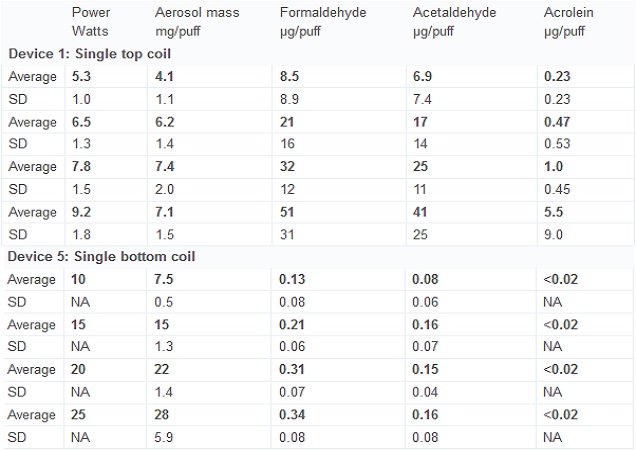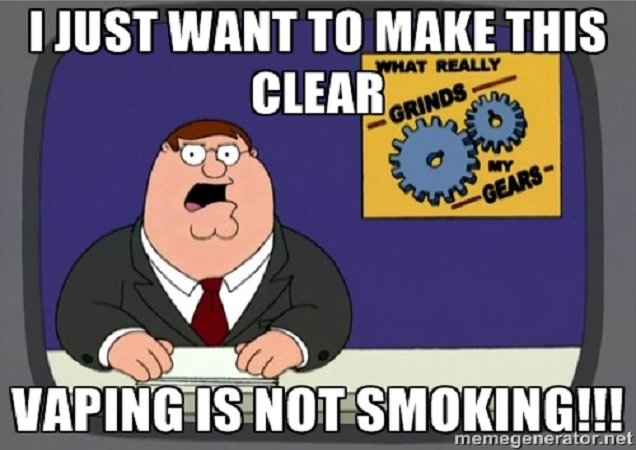
Researchers are spying on your tweets, the New England Journal of Medicine formaldehyde study is shown to be nonsense yet again, a judge in New York has been smart enough to declare that vaping is not smoking, a new campaign draws attention to the collateral damage from public health’s war on smoking, more evidence-based rationality emerges from the UK, we’re given a glimpse of more dangerous anti-vaping lunacy from Finland and journalists are given a much-needed dose of common sense on the (non) issue of “e-cigarette battery explosions” – it’s the Week in Vaping.
E-Cigarette Research
Formaldehyde in E-Cigarettes Tackled by Competent Researchers

Yet another study has demonstrated the serious issues with the conclusions drawn by the infamous New England Journal of Medicine formaldehyde study. Researchers tested five different atomizers – a CE4, Protank, Gladius, Nautilus and Subtank – at various wattages, with most tanks being tested using an iTaste VV but the Subtank being tested with a DNA 40 at higher wattages. The results showed that more capable atomizers – where dry puffs were unlikely due to the effective wicking – produced less formaldehyde, acetaldehyde and acrolein, with the Subtank producing just 0.34 micrograms of formaldehyde at 25 W compared to 8.5 micrograms per puff with the CE4 at just 5.3 watts. This drives home the problems with the NEJM study in spectacular fashion. The study got some reasonably positive coverage in Vice.
Boring But Useful Study May Allow More Detailed Evaluations of E-Cig Emissions
Researchers from Fontem Ventures have developed a method for measuring volatile organic compounds in e-cig vapor in “real-time,” which would allow for studies into the puff-by-puff variation in the chemical composition of e-cig vapor. This is one of those studies that’s pretty important when it comes to advancing understanding of the science behind vaping, but isn’t particularly exciting for non-researchers. PGVG has a write up of the study, if you’re interested.
Tanks Are Better Than Cartomizers for Consistent Nicotine Delivery
A study from Dr. Konstantinos Farsalinos – which was first released last month – shows that tank-type atomizers offer more consistent nicotine delivery than cartomizers, and has now been announced with a press release from the journal Addiction. The decision to publish a press release shows the importance of the study, particularly due to the requirement for consistency in nicotine delivery as part of the EU’s Tobacco Products Directive.
Spying on Vapers’ Tweets
Researchers at the NYU Langone Medical Center have been looking at huge numbers of tweets with hashtags like #vape #ecigs and #ejuice in the hope of inferring who is using them to quit smoking, who uses them for other reasons and how they’re being marketed. In other words, we can expect to see a “e-cigs are marketed to teens, who aren’t even trying to quit smoking” headline soon based on some spurious analysis of tweets.
Why You Shouldn’t Trust Headlines Based on Cell Studies of E-Cig Vapor
Brad Rodu has published an informative blog post about the recent spate of scaremongering headlines based on laboratory studies of the effects of e-cigarette vapor on cells in petri dishes. In short, the post points out that human bodies are much more complex than these artificial experiments, and are generally considerably more resistant to low doses of chemicals.
He writes:
Vapers should not be fooled by the irresponsible transformation of weak cause-and-effect analyses into hypothetical illnesses. Largely harmless products can be portrayed quite readily as dangers – coffee, for example, has not been linked to any serious disease, but one could point to lab studies showing that coffee kills cells (here and here) and promotes cancers (here). These claims would have about as much scientific credibility as the current claims against e-cigarettes.
Legislation, Regulation and Vaping Bans
NY Judge Rules Vaping is Not Smoking

In New York state, a court has ruled that vaping is not smoking, and therefore the ban on smoking across the state does not automatically apply to vaping. The case involved a man who received a citation for vaping on a subway platform, but challenged the decision. The judge pointed out that New York law defines smoking as “the burning of a lighted cigar, cigarette, pipe or any other matter or substance which contains tobacco,” and this is clearly not applicable to vaping. In New York City, there is a law specifically including vaping in the smoking ban, but the judge ruled that, at state level, existing law doesn’t cover vaping.
More Vaping Bans
Orange County will be proposing a ban on vaping in areas where smoking is already banned this year, accompanied by the usual statements about the potential for health risks to bystanders and the children. Coralville, Iowa is considering doing the same thing, and will vote on the proposal on Tuesday night.
Utah E-Cig Taxation Madness
Following the proposal in Utah to introduce an 86 % tax on vaping products and the “Students Against Electronic Vaping” group busing in school students to support the tax, there have allegedly been some threats against the group’s members from members of the Utah Vapor Association and the Utah Smoke Free Association. Why this would have happened is anyone’s guess; it’s hardly like the bunch of misled students is going to shape the decision.
Michelle Minton has written a great post over at the Competitive Enterprise Institute about Utah’s raft of irrational, unnecessarily burdensome proposals to tax vaping and ban vaping for anybody under the age of 21. She draws attention to the declines in smoking accompanying the rise in vaping among Utah youth, and quotes Jeff Stier, who hits the problem with taxing vaping on the head: “If the point of a sin tax is to discourage behavior, why would you put a sin tax on e-cigarettes, which are the alternative to smoking?”
SEVIA USA Formed to Combat E-Cig Regulation
Chinese manufacturers Aspire, Kanger, Innokin and Smok have formed SEVIA (Shenzen Electronic Vaporizer Industry Association) USA with the help of Dimitris Agrafoitis and Phil Busardo, with the hopes of helping on the front-lines against the excessive and needlessly burdensome regulation proposed for vaping products in the US.
Australia Needs to Learn From the UK on Vaping
A guest post on Catallaxy Files from Terry Barnes urges sensible regulation of e-cigarettes in Australia, drawing attention to the UK’s forward-thinking approach with regards to the technology and the perils of just assuming they’re dangerous and imposing stringent regulations just because you can.
News, Blog Posts and Other Stuff

A new campaign – No More Casualties – has been launched by NotBlowingSmoke and its creator Stefan Didak, aiming to draw attention to the potential consequences of the continuous spread of misinformation about vaping. Special interest groups like the Campaign for Tobacco-Free Kids and ones who should be more objective, like the CDC and the California Department of Public Health have been pushing an extremely misleading message that vaping is as harmful as smoking in the aims of protecting “the children,” while completely ignoring the disastrous effects it could have on adult smokers. The campaign sums it up: “Don’t make me a casualty of your war on smoking.”
A briefing on e-cigarettes for stop smoking services in the UK has been released, which continues in the impressively rational take on the issue of vaping. Clive Bates has a blog post on it, entitled “Blending evidence and empathy” – which really hits at the core of what those opposed to smoking need to do when it comes to vaping – and Dick Puddlecote has a post entitled “Slaughtering Sacred Cows” which focuses on the various ways in which the report skewers many of the anti-vaping tropes we’ve all become wearily accustomed to.
Fergus Mason has published a great post about e-cigarette batteries, presented as a guide for journalists and focusing on the one key point that basically nullifies all of the supposed concern about “e-cigarette battery explosions” – “There is no such thing as an e-cigarette battery.” Because all e-cigarette batteries are lithium batteries, just like the ones in phones, laptops, hoverboards, electric cars and pretty much all modern consumer electronics. This simple point has either eluded all of the best journalists in the world or would undermine the fear they wish to evoke. No prizes for guessing which.
Juhani Orelma has published another interesting (read: infuriating) translation of some discussion of e-cigarettes from Finland. The chairman of the country’s branch of ASH repeated scare stories about youth vaping and gateway effects, as well as promoting the results of Stanton Glantz’s disastrous meta-analysis of a bunch of poorly-conducted studies, which concluded that e-cigarettes impede quitting. Possibly worst of all, chairman Pekka Puska claims that Public Health England’s estimate that e-cigarettes are 95 % safer than smoking “is based on only a single study, which is funded by electronic cigarette and cigarette companies.” Assumedly he thinks the other 180-plus studies referenced had nothing to do with it.
Guide to Vaping has published an informative post on the effect of vaping on airway cells, using a study from last year as a guide and discussing the results and what they mean for vapers.
Nicotine Science and Policy has a good post on the lazy critiques of tobacco-industry funded research into e-cigarettes. Neil McKeganey and Christopher Russell make the argument that there is no evidence of foul play in recent research funded by the tobacco industry, and that criticisms tend to rely on evidence from decades ago and simply assume it’s still going on. They call it the new McCarthyism.
Bullshit of the Week – “Vaping is Really Bad for You, Because, err… the Immune System… Or Something”
Remember how the main risk from smoking is that it suppresses the immune system? No, neither do I. This is probably because smoking causes cancer, heart problems and a whole host of other conditions, and is so unilaterally dangerous that the impacts on your immune system barely ever receive a mention.
However, an article over at the Viral Pirate – clearly a great source for health-related information – has decided that vaping is “really fucking bad for you” because of the study last week that found that e-cig have a bigger effect on the expression of genes related to the immune system than cigarettes. Never mind that the practical implications of this aren’t actually known, the intrepid experts over at the Viral Pirate says this mean “[vaping] could actually be worse than regular cigarettes.”
Well, the Viral Pirate has spoken, everyone – back to cigarettes for us!
That’s it for This Week!
As always, we’ve aimed to cover as much as possible this week, but let us know in the comments if we’ve missed any important stories! And if not, check back next week for another edition.

